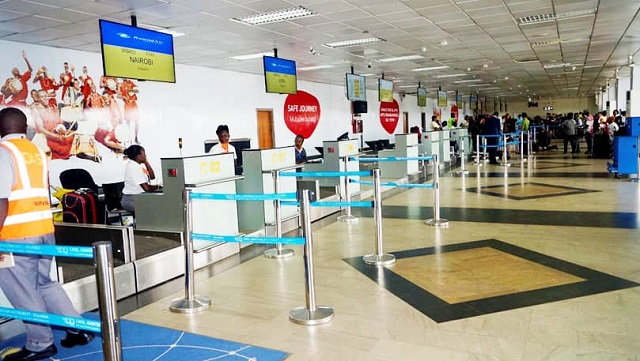
Rwanda is ranked best in EAC
Kampala, Uganda | RONALD MUSOKE | African countries are increasingly making better progress in their freedom of travel policies, most of which had been severely curtailed by the Covid-19 pandemic, according to the 2022 Africa Visa Openness Index.
The annual publication, prepared by the African Development Bank (AfDB) in collaboration with the African Union Commission, is now in its 7th edition and was launched on Dec.11 on the sidelines of the 2022 African Economic Conference in Balaclava, Mauritius.
“The Africa Visa Openness Index has been tracking visa openness as a measure of the freedom of movement since 2016. This year’s edition—the seventh—shows many African countries having greatly simplified their visa regime over the past year,” said Marie-Laure Akin-Olugbade, the Acting Vice President of the African Development Group.
The index measures the extent to which African countries are open to visitors from African countries. It also analyses each country’s visa requirements to show which countries on the continent facilitate travel to their countries.
For each country, the index calculates the number of African countries whose citizens must obtain a visa upon arrival, and the number of countries whose citizens do not need a visa to enter. It also tracks changes in the countries’ scores over time and then analyses how policies earmarked for freedom of movement across the continent are evolving.
Uganda drops down the index
Despite Covid-19 lockdowns and travel disruptions, 93% of African countries have maintained or improved their score compared to last year while two-thirds of the 54 countries that make up the African continent have gone ahead to adopt more liberal visa policies compared to six years ago.
This perhaps explains why this year saw Uganda fall to the 30th position from the eighth position it occupied last year while Burundi, Djibouti and Ethiopia made the most progress.
According to the 2022 edition, Burundi, Djibouti and Ethiopia have made the most progress in their visa openness with Ethiopia in particular rising several places on the index to retain its position in the continent’s top 20 performers after removing temporary measures instituted in 2021.
Within the East African Community (EAC) bloc, Burundi rose highest on the index, thanks to the new government’s decision to accept all African visitors into the country either visa-free (for East African citizens) or visa on arrival (rest of Africa). The initiative propelled Burundi from 44th position in 2021 to 12th this year.
Rwanda, however, remains the star performer on the index in the region. Rwanda accepts visitors from 18 African countries to enter its territory visa-free while the rest can get the visas on arrival. It is ranked fifth just behind Benin, Seychelles, The Gambia and Ghana.
“This edition links free movement to the development of regional value chains, investments, trade in services and the AfCFTA. There is greater recognition that human mobility is key to Africa’s integration efforts,” said Dr Monique Nsazabaganwa, the deputy chairperson of the African Union Commission.
This year’s report underlines the impact of the Covid-19 pandemic in the last two years (2020 and 2021) during which most countries restricted movement, both domestically and for international travel. Restrictions on international travel ranged from closing entire borders to quarantines, screening measures, and bans on visitors from countries deemed “high risk.”
Domestic restrictions included a range of measures such as prohibitions on travelling between provinces, bans on non-essential movement, curfews, and standard operating procedures that limited gatherings.
Still, the 2022 report reflects on renewed signs of progress. At least 10 countries have improved their visa openness score over the past year two years, and visa openness on the continent now exceeds that recorded during the year before the Covid-19 pandemic and is in line with the peak score achieved in 2020.
Three countries—Benin, The Gambia and Seychelles—offer visa-free entry to Africans from all other countries. For context, in 2016 and 2017, only one country did so. In addition, 24 African countries offer an eVisa. This is five more than five years ago.
Meanwhile, 36 countries have improved or maintained their Visa Openness Index score since 2016 while 50 countries have maintained or improved their Visa Openness Index score relative to 2021, usually after removing some of the visa policy restrictions implemented during the pandemic.
According to the report, 48 countries out of 54, the vast majority of African countries, now offer visa-free travel to the nationals of at least one other African country while 42 countries offer visa-free travel to the nationals of at least 5 other African countries.
Interestingly, lower-income countries account for a large share of the countries that make up the top-20 ranked countries in 2022 with liberal visa policies: 45% of countries in the top 20 on the index are classified as low-income countries, while a further 45% of countries are classified as lower middle-income.
EVisas allow prospective travellers to apply for a visa from the comfort of their home or workplace ahead of travel, streamline the application process reduce time at borders, provide a greater measure of certainty ahead of travel, reduce the need to submit a passport for processing to consular offices, and make travel safer and more secure.
Ecowas and EAC blocs
Meanwhile, in a new initiative, the report provides an analysis of the free movement of persons at the regional economic community level in Africa. According to the report, the Economic Community of West African States (ECOWAS) and the East African Community are the most open communities, with the ECOWAS bloc having eight of the top ten countries.
Commenting on the report, Jean-Guy Afrika, the African Development Bank Group Acting Director in charge of regional integration coordination office noted that the Africa Visa Openness Index has tracked the evolution of visa regimes on the African continent from before the pandemic to today.
Going forward, the report notes that progressive visa policies that increase visa-free entry or to visa on arrival policies could ensure that this positive trend continues. The use of technology and greater adoption of e-Visa systems could also help in fast-tracking the ease at which travellers can cross borders.
‘Travellers have told us that barriers to travel remain. Countries with complex visa procedures are losing the economic benefits that these travellers bring,” Nick Careen, the senior vice president for operations, safety and security at the International Air Transport Association (IATA) is quoted by the report.
“Where countries have removed visa requirements, tourism and travel economies have thrived and for countries requiring certain categories of travellers to get visas, taking advantage of traveller’s willingness to use online processes and share information in advance would be a win-win solution.”
 The Independent Uganda: You get the Truth we Pay the Price
The Independent Uganda: You get the Truth we Pay the Price



